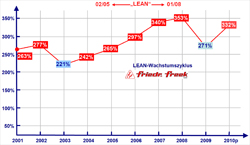
Unlike EUCOPET, the transition with LEAN, which called primarily for in- and inter-company collaboration and the involvement of employees, was easier to achieve. As early as the late 1990s, during the initiation and organisation of the EUCOPET cooperation, Freek had already begun transforming the corporate organisation into a cooperation organisation. At the same time – in the course of many years of in- and inter-company cooperation – the employees had developed from a group of excellent individuals to a top team whose social and, above all, cooperation competence has literally given Freek an inimitable competitive edge [10].
During the 2005 - 2007 project phase Freek's overall growth was such that, owing to lack of both space and infrastructure, in 2007 there were only limited possibilities for expanding the workforce. The resulting cramped situation with which the workforce had to cope was ended in 2008 with the completion of the urgently needed building expansions project.
The 10% rise in the sale of simple standard heating elements during the project was evidence that this had also benefited from the results achieved with LEAN. This already includes the approx. 15% 'natural' drop-off in sales due to insolvency, fusions or shifts that had to be compensated.
Equally as gratifying as the sales figures for the simple standard heating elements is the development in the customer and industry structures. Niche applications and technically more demanding industries, such as medical technology or special engineering, are becoming increasingly important. This circle of customers rarely produces such bulk buyers as the household appliance industry, but they do make our field of business more robust and promise sustained growth opportunities with higher marginal incomes. This development is reflected in the growing number of customers for simple standard heating elements. During the project these figures rose by 21%.
No less convincing than the result for traditional simple standard heating elements is that of the standard nozzle heaters (HMC). Following a 47% increase in 2006, there was a further 16% increase in 2007. This meant that by the end of the project they were 36% above the previous 2002 high, and 42% over the 2004 mark.
Major factors for the successful marketing of our standard products have been the 'Freek' brand of quality and the service-oriented Quick Response System. The key to this has been the flat hierarchy, continuous involvement, qualification and 'care of' employees, the successful introduction of the ERP system and numerous KISS organisation modules.

